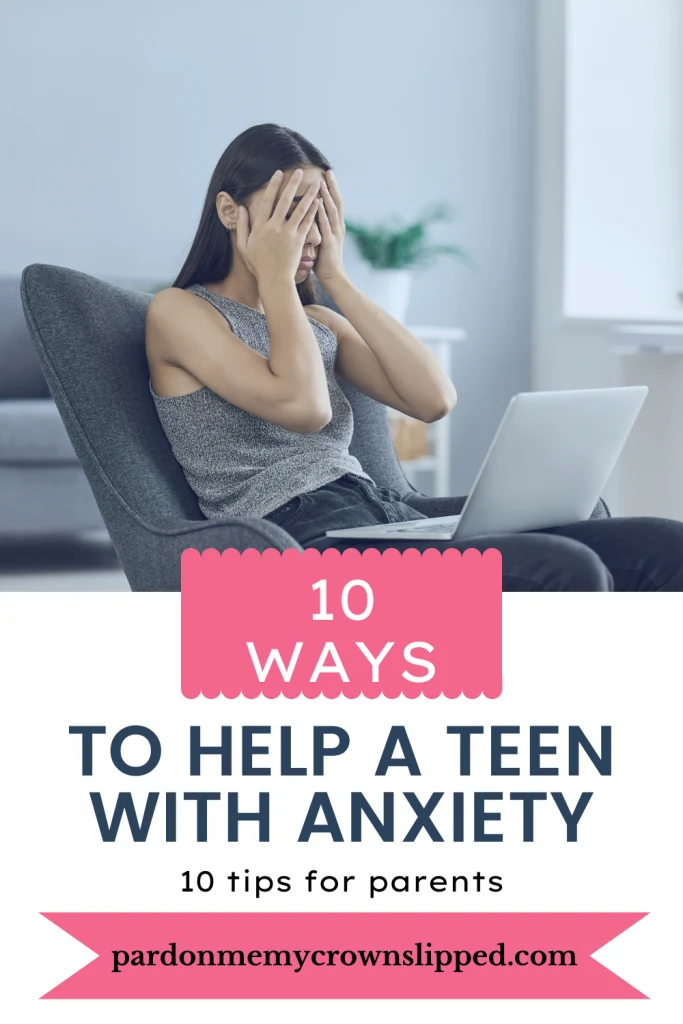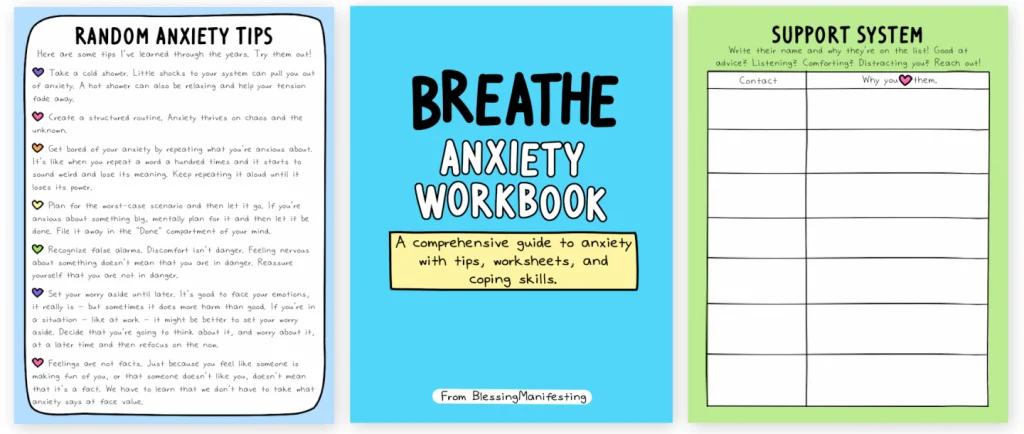Photo by Anthony Tran on Unsplash
It can be difficult to know how to help a teenager who is struggling with anxiety.
Anxiety disorders are the most common mental health issues in the United States, affecting 40 million adults.
But what about young people’s mental health?
Statistics show that 1 in 3 adolescents suffer from anxiety disorders. And that was before the pandemic.
If your teenager is one of those people, you may be feeling lost and helpless.
How can I tell if my teen is experiencing anxiety?
The first step to helping a teenager with anxiety is recognizing the signs. It can be difficult for parents to know when their child’s anxiety is part of normal teen behavior and when they may need professional treatment.
Here are some of the most common signs of anxiety that your teenager could be struggling with:
- They experience excessive worry about things that are out of their control
- They have a hard time relaxing and enjoying downtime
- They experience physical symptoms such as headaches, nausea, or dizziness
- Their academic performance starts to decline
- They withdraw from activities they used to enjoy like spending time with friends or other social interactions
There are many ways you can help your teenager if they’re experiencing anxiety. Once you understand what triggers their anxiety.

This post contains affiliate links. I will earn a commission at no additional charge to you if you make a purchase using my links. Click here to see my full disclosure policy.
1. Encourage your teenager to get regular exercise and eat a balanced diet

Exercise releases endorphins, which have mood-boosting effects. A healthy diet provides the nutrients that the brain needs to function properly.
Stress and anxiety can interfere with appetite and lead to poor nutrition. It’s important for teenagers to eat regularly and have a balanced diet.
In addition to eating a well-balanced diet, your teenager should get regular exercise. Aim for at least 60 minutes of physical activity on most days.
If your teen has trouble getting motivated or need help setting up an exercise plan, offer to go with them to the gym or take walks together outside each day after school.
Encourage your teen not to skip meals, especially breakfast. Skipping meals can lead to low blood sugar, which can make symptoms of anxiety worse.
Too much sugar and caffeine can also aggravate symptoms of anxiety.
There are many healthy ways for your teenager to cope with anxiety. Help them find what works best for them and make sure they know you’re always there to support them.
2. Help teens develop positive coping skills

Practical strategies can help your teenager feel more in control of their thoughts and feelings.
What are the 5 types of coping strategies for anxiety?
There are many different coping strategies that can help teens manage their anxiety.
Here are five common self-help tips:
- Distraction: This involves focusing on something else to take your mind off of your anxiety. Teens can do this by watching a movie, reading, listening to a podcast, or going for a walk. Many teenagers also find it helpful to express themselves through poetry, art, music, or other creative outlets. If this sounds like something your teenager could benefit from, encourage them to explore their interests.
- Positive self-talk: This involves talking to themselves in a positive way, even when they don’t feel like it. This can help teens stay hopeful and optimistic during tough times.
- Problem-solving: This involves coming up with solutions to the problems that are causing teens anxiety. This can help them feel more in control of their life and less overwhelmed.
- Relaxation techniques: These can help teens calm down their bodies and mind. Techniques such as yoga and meditation can be helpful. Journaling is a healthy way to process emotions, while deep breathing helps calm both the mind and body. Using a free app like Calm is a great way to help with anxious thoughts.
- Avoidance: This involves avoiding things that trigger their anxiety. This can be a difficult strategy to follow, but it can help in the short term.
Headspace, a website, and an app featuring a wide variety of sessions for meditation, focus, sleepcasts, and more is now FREE for teens. Check it out here at headspace.com
- 9 Writing Manifestation Methods: How to Manifest What You Want Today
- 5 Easy Relaxation Techniques for Teens and Tweens To Try Today
Items like fidget spinners, stress balls or even slime can relieve some anxiety.
3. Promote healthy sleep habits in teenagers

Sleep is important for all aspects of good mental health, and it’s especially essential for teens. How much sleep your teen needs will vary according to his or her age and individual requirements.
Most teens need between eight and nine hours of sleep every night, although some may need more or less.
How can I help my teenager get enough sleep?
Avoid drinking coffee or other caffeinated drinks in the afternoon, as they can interfere with your teen’s ability to fall asleep at night.
Some teas can help with anxiety.
- Sleep Tea 1.0 oz by Art of Tea

- Price: $19.00
- Happy Tea Loose Leaf 4 oz Zip Pouch by Art of Tea

- Price: $24.00
Encourage them not to use devices like smartphones, tablets, or video games within two to three hours of bedtime. Engaging in social media close to bedtime can add to their anxious feelings.
Set a consistent sleep schedule so that your teen goes to bed and wakes up at the same time every day. This will help their body get used to a regular sleeping routine.
How To Clean A Weighted Blanket: Easy Care Tips to Keep It Just Like New
4. Teach teens how to identify and manage stress triggers

Stress triggers are anything that causes your teenager to feel anxious. This can include things like social situations, big tests at school, or even sleeping alone in the dark.
Once you know what your teenager’s triggers are, you can help them develop a plan for managing each one.
For example, if they have an upcoming test that’s causing anxiety, you could help them devise a study schedule and practice test-taking skills.
If they have trouble sleeping in the dark, maybe it would be helpful for them to sleep with a nightlight or leave the door open so that there’s more light coming from outside their room.
It may take some trial and error before you find the right strategies for your teenager, but it’s important to keep trying.
- How to Help Your Tween's Poor Attitude Problem
- Defusing Teen Attitudes: The Ultimate Guide
- Signs of ADHD in Teenagers: Tips for Symptoms in Teens
5. Offer teens emotional support and understanding

If you have a teenager who experiences anxiety, it can be difficult to know what to say to them. There are things you can do to help them cope and feel better.
It’s important that you express your support and love, but don’t dismiss their feelings or try to fix everything yourself.
Here are some things family members can say to help an anxious teen feel supported:
- “I love you and I’m here for you.”
- “It sounds like things are really tough right now. How can I help?”
- “You don’t have to deal with this on your own. Let me help you find a therapist or medication that works for you.”
- “I know things are hard right now, but I believe in you and your ability to get through them. How can we work together to make this easier? “
Anxiety can be a difficult thing to deal with, but with the right help and support, it is possible to manage it.
If your teen needs help dealing with their anxiety, there are several options available.
You may want to schedule an appointment with their pediatrician or family doctor so that they can be evaluated and referred to a mental health professional for treatment.
Consider too that family therapy can help support anxious teens.
6. Encourage young people to talk about their feelings

Many teenagers bottle up their feelings, especially when they’re experiencing anxiety. This can be harmful in the long run, as it can lead to more intense and prolonged periods of anxiety. Encouraging your teenager to talk about their feelings can help them deal with them in a healthy way.
Listen carefully and try not to interrupt or offer advice until they’re done speaking. Sometimes, just having someone listen can make all the difference in how your teen feels.
It can also be helpful for them to keep a journal where they write down their negative thoughts and anxious feelings. This allows teens to express their emotions in a safe space where no one else can read what they’ve written.
Poetry for Teenagers: 5 Ways To Discover, Write, and Love Poems (2022)

7. Encourage teens to do the things they love and surround themselves with people who make them feel good

If your teenager likes to draw, let them draw. If they like to run, encourage them to go for a jog or take part in a sport at school.
Physical activity helps keep the mind busy and can help bring down stress levels.
Some teenagers find that volunteering is a great way to do something positive that makes them feel good.
Make sure that you are encouraging positive friendships as well — it’s important that teenagers have supportive friends who will make them feel good about themselves.
A positive support system is key in helping teenagers manage anxiety.
8. Explain the difference between normal anxiety and an anxiety disorder

Sometimes, it can be hard to tell the difference between normal anxiety and anxiety disorders.
Normal anxiety is when you have temporary feelings of worry or nervousness that pass quickly.
Anxiety disorders occur when these feelings last for at least six months and interfere with daily activities such as schoolwork, social life, and sleeping.
Signs of anxiety disorders
- Irritability, restlessness, or feeling angry a lot
- Fear, nervousness, or worrying too much about things that might happen in the future. Sleeplessness and difficulty sleeping at night.
- Being easily startled by loud noises or being startled often when there is no obvious reason for it (e.g., someone sneezes).
Panic disorder in teenagers
Panic disorder is a type of anxiety disorder that involves repeated panic attacks. A panic attack is a sudden feeling of terror that can last for minutes or hours. Physical symptoms of a panic attack include:
- Chest pains, racing heart rate, or dizziness
- Shortness of breath or feelings of choking
- Feeling like you’re having a heart attack or dying.
Once your teenager realizes that it’s okay not to feel perfectly calm all the time, they might be more likely to talk about their anxiety or seek professional help for it.
The good news is that anxiety disorders are highly treatable with medication, therapy, or a combination of both.
Perhaps they're a highly sensitive person, which is a personality type that naturally processes the world in a different way.
9. Teach your teenager that it is okay to ask for help

Teenagers are often reluctant to ask for help, especially if they’re experiencing anxiety. This can be due to feelings of embarrassment or fear that others will judge them.
Your teenager needs to know that there’s nothing wrong with asking for help when they need it.
If they feel overwhelmed or anxious, encourage your teen to talk to someone they trust. This could be a friend, family member, therapist, or school counselor.
If your teenager is reluctant to seek professional help, you may need to take the lead and make an appointment for them.
10. Help teens find a therapist or counselor they can trust

If your teenager is struggling with anxiety, they may want to see a mental health professional.
Good mental health professionals will listen patiently and help your teenager develop strategies for managing their anxiety.
You may also want to consider talking with a therapist or counselor who specializes in working with teenagers.
Your teenager should feel comfortable talking to their therapist about anything that’s on their mind. If they ever feel like the therapist is not a good fit, they should be encouraged to find someone else.
It can be difficult to find the right therapist but don't give up. The right professional support will make all the difference.
It may also help your teenager realize that they aren’t alone and that others have similar experiences.
Finally, remind your teenager that they are not their anxiety and that it does not define them as a person.
Helping your teenager to understand and cope with their anxiety can be difficult. With time, patience, and the right tools, you will help your teenager to overcome their anxiety.
If you’re feeling lost and don’t know how to help your child who is struggling with anxiety, there are many resources available to you.
The most important thing is to remain patient and supportive. Helping your teenager become resilient will take time, but it is worth the effort.
How can I learn more about helping my child become resilient?
There are many resources available to help parents learn how to help their children become resilient.
Some great places to start include the following:
The American Psychological Association has a helpful website with articles and tips on how to build resilience in both adults and teenagers.
The National Child Traumatic Stress Network also offers a variety of resources on helping children cope with traumatic experiences.
The Center for the Developing Child at Harvard University has a wealth of information on early childhood development and resilience.
The Anxiety and Depression Association of America offers helpful articles and videos on the topic.
These organizations offer helpful advice, articles, and videos.
By exploring these resources, parents can learn about the important building blocks of resilience and how they can help their children develop them.
The best way to help your teenager is by finding out more about their symptoms and getting them the right treatment.
You can start by asking some questions such as:
- How long have they been experiencing these symptoms?
- How often do they occur?
- How much does it bother them?
With time and effort, parents can give their teenagers the tools they need to thrive in life, no matter what challenging situations come their way.

Frequently Asked Questions
Can puberty cause panic attacks?
There’s no one definitive answer to this question. For some children, puberty can be a difficult time when they feel like they are going through a lot of changes both physically and emotionally.
This can lead to increased feelings of anxiety and stress.
For others, there may not be any specific event that triggers their panic attacks during puberty. Instead, it could be due to changes in hormone levels or other physiological factors that occur during this time of life.
What causes anxiety in a teenager?
There are many factors that can cause anxiety in a teenager. Some of these include:
- Family history of mental illness (e.g., depression, bipolar disorder) or substance abuse problems.
- Stressful life events such as moving to a new school or home, the death of someone close to them, or abuse.
- Academic pressure from schoolwork and expectations of parents/teachers to perform well on tests or in sports.
What is the 3 3 3 rule for anxiety?
There are many different ways to manage anxiety. One of the most effective techniques is called the “333” rule which involves breathing in for three seconds, holding your breath for another three seconds, and then exhaling slowly over a period of three seconds.
This method can help you stay calm during stressful situations and prevent your anxiety from getting out of control.
You can do this technique anywhere, anytime – even in the middle of a panic attack. It’s a great way to take charge of your anxiety and feel more in control.







